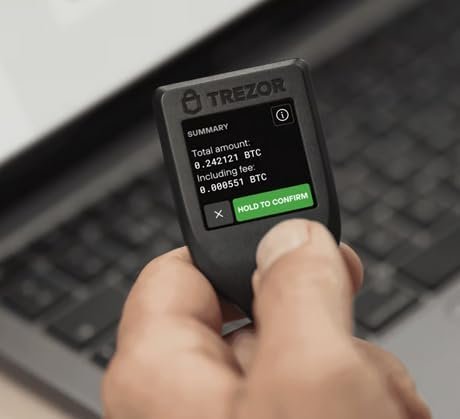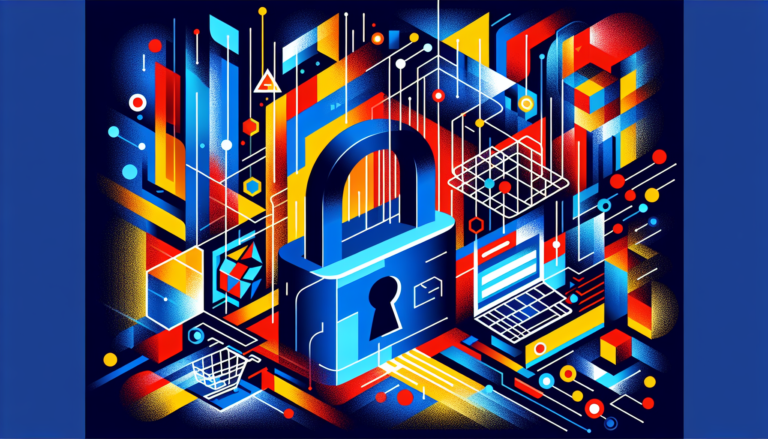Learn how to secure cryptocurrency investments in 2024! Discover essential security measures, best storage practices, and expert tips to protect your digital assets.
Whether you’re just starting out or trading for a while, brushing up on your cybersecurity can save you loads of trouble. And if you’re a newbie, swing by our Cybersecurity for Beginners: The Complete Guide.
Understanding Cryptocurrency Security Basics
Keeping your crypto safe is like guarding your stash of gold coins—super important! We’ll discuss how to do just that, giving the lowdown on private keys, public addresses, and wallets in a way that won’t make your eyes glaze over.
Why Crypto Security Isn’t Like Your Bank’s
Crypto security ain’t your old-school banking. Why? Well, because we’re dealing with a wild beast that’s decentralized. While big companies with lots of rules run your regular bank, crypto’s playground is the blockchain—no middlemen, no bosses. It’s like playing soccer without a referee! So, keeping your digital dollars safe falls squarely on your shoulders.
If sneaky hands swipe your cash with a bank, there’s a bouncer—fraud protection—to help get it back. The crypto world? Not so much. Once you hit that send button, your coins are out for good. So, seriously, lock down your stuff!
Sneaky Bad Guys and Crypto
You might watch movies and laugh at funny heists, but crypto heists are all too real. The baddies are always cooking up new ways to get ahold of your digital gold:
- Hacking: They find ways around your wallet’s defenses faster than you can say “tech geek.”
- Phishing: Crooks set up fake websites to snag your passwords or keys, basically tricking you with shiny bait.
- Malware: This nasty software invites itself onto your computer to snoop and grab your secrets.
- Social Engineering: They sweet-talk or scare the beans out of people to spill their beans.
Knowing about these scams will help keep your digital piggy bank safe and sound.
Private Keys vs Public Addresses Explained
Alright, let’s break it down: these “keys” and “addresses” you’re hearing about? They’re the Batman and Robin of the crypto world:
- Private Keys: Imagine having a master key to all your treasure chests. This is the magic number that lets you move your money.
- Public Addresses: This one? It’s like a cool mailbox where people can drop you cool letters or, in this case, cryptocurrencies without peeping inside.
Got that? Good! Never lose sight of your private key or poof—bye-bye digital dough.
The Importance of Seed Phrases
Enter the hero, the mighty seed phrase! A bunch of random words—kinda like your grandma’s recipes—that act as your lifeline if you ever forget your key. Jot it down and stash it somewhere thieves won’t find it, like your sock drawer.
For in-depth ways to keep all your digital business secure, check out our piece on how to backup data securely.
Different Types of Crypto Wallets
Picking the right wallet is like choosing a car: it depends on what you will use it for. Let’s look at the options:
- Hardware Wallets: These gadgets keep your keys offline—old-school safe.
- Software Wallets: Put ’em on your computer or phone, but guard them like your top-secret spy gadgets.
- Mobile Wallets: Perfect for geeks on the move, but not super secure.
- Paper Wallets: Literal paper with your keys scribbled on—don’t spill coffee on ’em!
- Multi-Signature Wallets: Like needing two keys to open a door—teamwork!
Protecting your crypto is serious business. For tips that go even deeper, check out our guides on how to create strong passwords.
Choosing the Right Cryptocurrency Wallet
Picking the perfect wallet is all about keeping your crypto stash safe. Let’s examine some wallet types and what makes each one tick.
Hardware Wallets Compared (Ledger, Trezor, etc.)

Hardware wallets are like little vaults for your crypto keys. They stay offline, keeping internet baddies at bay. If you’re in it for the long haul, these might just be your best bet:
| Feature | Ledger | Trezor |
|---|---|---|
| Security | Top-notch | Top-notch |
| Usability | Easy-peasy | A bit tricky |
| Backup | Recovery seed | Recovery seed |
| Connectivity | USB | USB |
Hardware wallets stand as mighty defenders in the crypto world. Great for newbies in crypto safety, they’re like the seatbelt and airbag of the crypto ride.
Software Wallet Security Features
Software wallets, or “hot wallets”, hang out on your computer or phone. They’re super handy but need a good security net:
- Encryption: Keeps your secrets, well, secret.
- Two-Factor Authentication (2FA): Cranks up the safety. Curious? What is 2fa has the full scoop.
- Backup Options: Regular backups are your crypto insurance. Our how to backup data securely piece is a must-read.
Software wallets are daily drivers, perfect for your day-to-day crypto shenanigans. Just keep an eye on those potholes of vulnerabilities.
Mobile Wallet Pros and Cons
Mobile wallets shine with their “anytime, anywhere” access, but they come with strings attached:
Pros:
- Easy to carry around
- Quick wallet-to-wallet fun
- Simple layouts
Cons:
- Targets for malware and hacks
- Relies on your phone’s safety net
When rocking a mobile wallet, make your phone a fortress. Our How to Your Secure Smartphone Guide can help.
Paper Wallets for Long-Term Storage
Paper wallets? Yep, just good ol’ paper with your crypto keys. They’re off the grid security-wise but you have to handle with care:
Pros:
- Full offline protection
- Can’t be hacked online
Cons:
- Prone to getting lost or trashed
- Needs careful babysitting
If you’re hoarding for a while, paper wallets work, but stow them somewhere super safe. For tips on safeguarding your documents, check out how to secure cloud storage.
Multi-Signature Wallet Benefits
Multi-signature wallets need a few keys to sign off on a transaction, boosting your security game:
Benefits:
- More security, less worry
- Great for partnerships and shared accounts
- Stash keys in different spots for extra safety
If you have a hefty crypto piggy bank, multi-sig wallets can be smart, providing an extra shield against mischievous hands.
These pointers should steer you towards the wallet that matches your crypto safety needs. To strengthen your online defenses, peep our guides on crafting a strong password and finding the best password manager.
Best Practices for Private Key Management
Managing your private keys is critical if you want to control your crypto stash. I’m here to share how I keep my keys safe and sound.
Safekeeping Your Private Keys
Think of private keys as the golden ticket to accessing your digital dough. If you don’t keep ’em safe, poof, they could vanish into thin air. Here’s my game plan:
- Hardware Wallets: These nifty gadgets keep your keys tucked away offline, dodging those pesky hackers by a mile.
- Secure Spots: Find a snug little nook, like a safe, for your hardware wallet—think of it as a cozy bed for your digital treasure.
Backup Plans for Your Lifeline Phrases
Your recovery phrase is the lifeboat you’ll need if your private key jumps ship. Here’s how I handle mine:
- Duplicate Them Wisely: Make copies of that precious phrase and stash them in safe nooks and crannies.
- Physical Safety: Tuck them away in places like a safe deposit box—they’ll be happy campers there.
Bulletproof Password Tricks
Passwords stand guard like bouncers outside a swanky nightclub—ensure they’re up to the task. Here’s how I beef up security:
- Uncrackable Passwords: Mix it up well with letters, numbers, and quirky symbols. Our how-to-create-strong-password guide can show you the ropes.
- Password Vaults: Password managers turn into trusty sidekicks here, generating and storing those fortress-like passwords. Peek at our list of best password manager picks.
Lock-And-Load Physical Security
Don’t skimp on the physical stuff—keep gear away from sticky fingers and nosy Nellies.
- Hideaway Storage Devices: Use those gadgety hardware wallets and squirrel them away in fortified spots.
- Controlled Entry: Be picky about who gets the keys to these forts, and keep ’em hidden behind curtains.
Planning for the Unexpected
Expect the unexpected, right? Make sure you and your crew can grab those keys if life throws a curveball.
- Write It Down: Jot down instructions on how to get to your keys and hide that guidebook somewhere safe.
- Reliable Confidantes: Choose people you trust with your life to step in and take over if you’re missing.
Put these moves to the test, and you have a pretty bulletproof plan for your crypto bunkers. Want to boost your tech safety knowledge? Check out our Cybersecurity for Beginners Guide.
Setting Up Strong Exchange Security
If you’re diving into the cryptocurrency pool, keeping your treasures safe should be at the top of your list. Here’s how I double-bolt the doors on my crypto stash.
Two-Factor Authentication Setup
Two-factor authentication (2FA) is like the deadbolt on your digital assets. It’s not just your password anymore; you’ll need a second layer like a code sent to your smartphone through SMS or an app. Want the full scoop on 2FA? Check out what is 2fa.
| Authentication Method | Description |
|---|---|
| SMS-based 2FA | Code zaps over through text |
| App-based 2FA | Code pops out from an app |
| Hardware token | Little gadget that churns out codes |
Exchange Selection Criteria
Not all exchanges are created equal. When picking yours, eye the security, their street cred, and whether they play by the rules. A little detective work on their breach history wouldn’t hurt either.
| Criteria | Importance |
|---|---|
| Security Features | Very High |
| Reputation | Very High |
| Regulatory Compliance | Kind of a big deal |
| User Reviews | Not too shabby |
Withdrawal Limits and Whitelisting
Cautious is king when you’re dealing with withdrawals. Setting a cap on your funds means if someone gets sneaky, they can’t run off with the whole pot. Whitelisting is like having a VIP list of approved addresses—only buddies allowed access.
| Feature | Benefit |
|---|---|
| Withdrawal Limits | Cuts down on what crooks might swipe |
| Whitelisting | Keeps transactions in the trusted zone |
Email and Phone Security
Consider your email and phone like the keys to your online vault. Safe, unique passwords for your email and 2FA on your accounts are a must. Watch out for sketchy emails trying to phish for your info and keep your mobile settings shipshape.
Tips for Email and Phone Security:
- Lock down your email with strong passwords, see how to create strong password.
- Dodge phishing traps with how to identify phishing emails.
- Get your smartphone armed with the best security apps mobile.
API Key Management
Guard those API keys if you’re using bots or letting third-party pals peek at your trading. Only give them as much access as needed. Do not turn on withdrawal permissions unless you really have to.
| API Key Permission | Risk Level |
|---|---|
| Read-Only | Low risk |
| Trading | Watch it |
| Withdrawal | Walk the plank risky |
Nailing down these tactics can give you peace of mind and keep your digital coins snug in their virtual vault.
Cold Storage Implementation
So, you’re looking to keep your digital coins safe and sound, huh? Let me tell ya how I stash my crypto away from prying eyes using cold storage.
Setting up Cold Storage Properly
Cold storage is about keeping your crypto away from the wild, untamed internet. I go old-school with an air-gapped gadget—a hardware wallet or even a paper wallet—to stow away private keys. When offline, they’re out of reach for those pesky cyber lurkers.
Air-gapped Computer Usage
When it comes to pure security, air-gapped computers are my jam. These machines have never made an online debut. I use them to whip up and stash my private keys securely.
Physical Security Considerations
Now, you wouldn’t leave your gold bars lying around, would you? Same deal here. My hardware or paper wallets chill in a lockbox, or better yet, a safe. It’s all about thwarting thieves or damage.
| Security Measure | Description |
|---|---|
| Lockbox/Safe | Keeps that hardware or paper wallet locked down tight |
| Secure Location | Keeps it away from sticky fingers and harm’s way |
Backup Procedures
I’m a stickler for having backup plans. I make copies of my private keys and seed phrases and scatter ’em in different safe spots. Curious about the right way to back up? Peek at how to backup data securely.
Testing Recovery Processes
Trust, but verify, right? I occasionally do a test run of my recovery process. By simulating a recovery, I confirm my backups are legit so I won’t be left high and dry. It’s better to find out if there’s a problem when the stakes aren’t high.
By following these cold storage moves, I’m doing my best to keep my crypto stash locked down tight. For extra security advice, see how to secure cryptocurrency investments.
Protecting Against Common Crypto Scams
Keeping your crypto investments safe from fraudsters involves knowing their tricks and putting up defenses. Here’s how I handle this shifty business.
Identifying Phishing Attempts
Phishing is a sneaky way scammers try to nab your sensitive info. Here’s my playbook:
- Double-Check Email Addresses: Scammers often use email addresses that look almost right, except for little changes. Always give them a second look.
- Inspect Links: Hover your mouse over links to see where they go before you click.
- Skip Unexpected Downloads: Avoid opening attachments unless you know and trust the sender well.
Check out our guide on sniffing out phishing emails.
Spotting Fake Exchanges
Low-quality fake exchanges aim to swindle your money and personal info. Here’s how I spot them:
- Confirm Their Legitimacy: Do your homework on the exchange. A quick search can save you a lot of trouble.
- Stick to the Pros: Only trust your money with big-name, reputable exchanges like Crypto.com or Coinbase.
- Look for HTTPS: Ensure the site is secure by looking for HTTPS in the web address.
Learn more about browsing securely by visiting the Safe Surf Guide.
Avoiding Pump and Dump Schemes
Pump and dump schemes are shady tactics to manipulate crypto prices for shady profits. Here’s my strategy to avoid them:
- Be Wary of Surges: Sudden spikes in trading volume often mean something fishy.
- Don’t Buy Hype: Ignore the loud noise from social media or online forums.
- Do Your Homework: Always base your decisions on solid, reliable info.
Verifying Smart Contracts
Smart contracts are risky if they aren’t checked properly. Here’s my approach to them:
- Trust Audited Contracts: Make sure a trustworthy firm has audited the contract.
- Read the Fine Print: You can scan the smart contract code yourself or have an expert review it.
- Start Small: Test the waters with a tiny amount of crypto.
Recognizing Social Engineering Tactics
Social engineering is all about sweet-talking folks into giving away private stuff. Here’s how I keep it in check:
- Beware of Random Requests: Be cautious if someone you don’t know wants your info.
- Check Caller ID: Always know who’s asking for your data.
- Stay Informed: Keep up with what kinds of tricks are out there and spread the word to your friends and family.
Dive further into staying safe with our reads on preventing identity theft and social media safety tips.
By sticking to these moves, you can dodge a lot of the nasty stuff out there trying to nab your digital coins. Keep on your toes and always think about security while wandering the crypto scene.
Recovery and Inheritance Planning
Let’s talk about keeping your crypto safe for the long haul. I’ve got a few tips on setting up a fail-proof game plan for when life does its thing. It’s all about ensuring your digital gold is in good hands, come what may.
Creating a Crypto Inheritance Plan
No one likes to think about the inevitable, but it’s important. A solid inheritance plan ensures your crypto stash is in the right hands. I suggest writing everything down—step-by-step plans on who gets what and how they can get their hands on it. Trust me, your family will thank you for making it simple.
| Step | Description |
|---|---|
| 1. | Write down who gets your crypto goodies. |
| 2. | Jot a list of your crypto and secret keys. |
| 3. | Leave clear instructions on dealing with your assets. |
Emergency Access Procedures
Life can throw curveballs, so having a plan to grab your assets in an emergency is a must. Consider setting things up so a few trusted folks get access if something unexpected happens.
| Step | Description |
|---|---|
| 1. | Pick a couple of trusty people for access in an emergency. |
| 2. | Use wallets requiring multiple approvals for access. |
| 3. | Make sure your backup folks know how to reach your secret instructions and codes. |
Documentation Best Practices
Good record-keeping makes all the difference. Keep everything—your recovery phrases, keys, and detailed instructions—in a place that’s both safe and easy to reach when needed. And don’t forget to check and update them every now and then.
| Best Practice | Description |
|---|---|
| Secure Storage | Tuck away documents somewhere secure, like a locked box. |
| Regular Updates | Refresh your docs to match any changes in your holdings. |
| Clear Instructions | Give straightforward steps, avoiding any guesswork. |
Legal Considerations
Get the legal side of things sorted out, too. A friendly chat with a lawyer can smooth out any bumps and ensure the book does everything. Having a legally sound plan can save trouble down the line.
| Aspect | Description |
|---|---|
| Will Preparation | Make sure your crypto is included in your will. |
| Legal Compliance | Double-check your plans with relevant laws. |
| Executor Appointment | Find someone savvy to handle your wishes. |
Family Education and Training
Bringing your family up to speed on crypto is key. A little teach-and-preach might just save them a headache. Make time to explain the essentials and keep them savvy on keeping digital assets secure.
| Training Area | Description |
|---|---|
| Basic Crypto Knowledge | Introduce basics of crypto and blockchain to the fam. |
| Wallet Management | Show them how different wallets work and manage them. |
| Security Practices | Share tips on nailing online safety and crafting tough passwords. |
With these strategies, you’ll have peace of mind knowing your digital currency stays secure and lands in the right hands, no matter what life throws your way.
Wrapping It Up
Diving into cryptocurrency investments is like dancing in a world full of shiny possibilities and hidden potholes. You gotta be smart about it. In this guide, we’ve covered some key moves to keep your crypto nice and safe.
First off, knowing the basics of cryptocurrency security is a must-do. Unlike your regular bank account, crypto needs a different playbook. Know the threats lurking around and why private keys, public addresses, and seed phrases are vital. Also, be wise about picking the right crypto wallet—hardware wallets pack a punch in security, while software wallets are easy-breezy with some cool encryption. Mobile wallets are handy but come with their own set of booby traps, and paper wallets are for the long haul. Then there are multi-signature wallets for those who want extra peace of mind.
Handling your private keys like treasure requires some serious planning. Think safe storage, backup plans, and rock-solid passwords. Also, give some thought to physical security, like how to keep your loot secure and ready for any situation that comes your way.
Now, when setting up on exchanges, it’s all about two-factor authentication (peep more insider 2FA stuff), grabbing the good exchanges, and setting smart limits. Keep your email and phone game strong, and know how to manage those tricky API keys.A
Are you switching to cold storage? Yeah, that’s like having your own vault. Set it up with air-gapped computers, monitor those hardware pieces, and do the backup and recovery drills.
Stay sharp to dodge crypto scams. Learn to sniff out phishing schemes, spot fake exchanges, steer clear of pump-and-dump setups, check out those smart contracts, and dodge social engineering tricks.
And hey, think ahead—make sure you’ve got a plan for handing off your treasure to the fam. The deal includes an inheritance plan, clear emergency steps, knowing the legal ropes, and keeping the folks updated.
By getting these moves down, you’re putting your crypto under serious ninja protection and cruising through the digital jungle with style. Want more juicy tips on staying safe online? Dive into our handy guides like Email Security Tips, Creating Strong Passwords, and How to Secure Smartphones. Putting in the time and effort will mean keeping your precious haul away from the bad guys.




